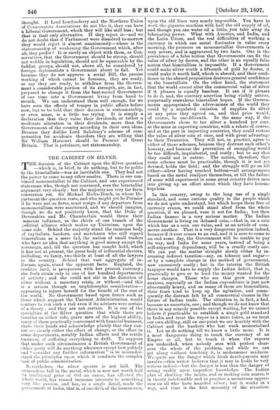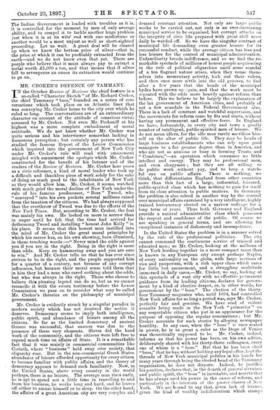THE CABINET ON SILVER. T HE decision of the Cabinet upon
the Silver question —which is, in brief, to do nothing, but to be polite to the bimetallists—was an inevitable one. They had not the power to come to any other resolve. There is one con- vinced monometallist in the Cabinet, and' one experienced statesman who, though not convinced, sees the bimetallist argument very clearly ; but the majority are very far from conversion yet. Sir Michael Hicks-Beach, in whose De- partment the question rests, and who might yet be Premier if he were not so fierce, must resign if any departure from monometallism were sanctioned, and we should imagine, though we do not positively know, that the Duke of Devonshire and Mr. Chamberlain would throw their mmense influence, as the chiefs of one branch of the political alliance which makes up Unionism, upon the same side. Behind the majority stand the immense body of capitalists, bankers, and merchants who still regard bimetallism as a mere fad, the nation of small traders who have no idea that anything is good money except the sovereign, and, till the question has caught hold, which it has not at present, the great body of influential electors, including, we fancy, two-thirds at least of all the lawyers in the country. Behind that vast aggregate of in- fluence, again, stand the apparent facts. England, the creditor land, is prosperous with her present currency ; she feels strain only in one of her hundred departments of activity ; and she could not stir in the direction of silver without a monetary crisis, or without—and this is a serious though an unphilosophic consideration— appearing to injure herself for the benefit of the rest of the world. No Government based upon forces such as those which support the Unionist Administration would venture to run such a risk even if its advisers were certain of a theory ; and they are not certain. It is one of the specialties of the Silver question that while there are fanatics on either side, grave men of the highest ability, many of them practically conversant with financial business, shake their heads and acknowledge plainly that they can- not see clearly either the effect of change, or the effect in some departments, notably Indian affairs and the textile business, of suffering everything to drift. To suppose that under such circumstances a British Government of either party will do anything whatever except bow politely and "consider any further information" is to misunder- stand the principles upon which it conducts the complex task of public administration.
Nevertheless, the silver spectre is not laid. The tremendous fall in the metal, which is now not worth half its traditional price of 60d. an ounce, has affected the whole world, has roused immense interests to something very like passion, and has, as a single detail, made the government of India, that is, of one-fifth of the human race, upon the old lines very nearly impossible. You have to work the gigantic machine with half the old supply of oil, and though you can water oil a little, you take away its lubricating power. What with America, and India, and the Latin Union, and the real difficulties of working a currency in which one metal fluctuates in value every morning, the pressure on monometallist Governments is very severe, and is aggravated by two facts. One is the prevalence of a false notion that Governments can fix the value of silver by decree, and the other is an equally false notion that bimetallism is impossible. If a Government could make silver worth a fifteenth of gold by decree, it could make it worth half, which is absurd, and their confi- dence in the absurd proposition destroys general confidence in the bimetallists. On the other hand, the statement that the world cannot alter the commercial value of silver if it pleases is equally baseless. It can if it pleases to do it, and, the contrary assertion being visibly untrue, perpetually reawakens bimetallist hopes. If the Govern- ments appropriated the silver-mines of the world they could by a regulated emission of supplies fix silver at any price they agreed on, and that price would, of course, be one-fifteenth. In the same way, if the Governments chose to tax silver a hundred per cent. at the mine in exporting countries, with a rebate of course, and at the port in importing countries, they could restore the value of silver coin at once, and with great advantage to their Treasuries. They will not, in practice, agree to either of these schemes, because they distrust each other's honesty, and because the prevention of smuggling would be too difficult, inquisitorial, and costly; but to say that they could not is untrue. The notion, therefore, that some scheme must be practicable, though it is not yet devised, holds the field; and the struggle will go on till either—silver having touched bottom—all arrangements based on the metal readjust themselves, or till the failure of some wild experiment in some great country drives men into giving up an effort about which they have become hopeless.
In this country, owing to the long use of a single standard, and some curious quality in the people which we do not quite understand, but which keeps them free of currency crazes, we could stand aloof from the whole question, if we pleased, were it not for India; but then Indian finance is a very serious matter. The Indian Government is living on debased coin,—that is, on a coin which has as a coin one value, and as an article of com- merce another. That is a very dangerous position indeed, because if it ever comes to an end, and it is sure to come to an end some day, the Government will be unable to pay its way, and India for some years, instead of being a self-supporting dependency, will be a cruelly costly one. We can put the matter straight slowly either by in- creasing indirect taxation—say, on tobacco and sugar— or by a complete change in the method of government, now excessively costly ; but in the interim the British taxpayer would have to supply the Indian deficit, that is, practically to give or to lend the money wanted for the home charges. Those who see this grow extremely anxious, especially as the Indian expenditure is just now abnormally heavy, and as many of them are bimetallists, their fears tend to keep up the agitation, and conse- quently the distrust felt by all commercial classes in the future of Indian trade. The situation is, in fact, a bad, because an uncertain, one ; and though we do not know that there is any remedy possible except waiting, for we cannot believe it practicable to establish a single gold standard in India and treat the rupee as a mere token, as we treat our own shilling, still on one point we are heartily with the Cabinet and the bankers who last week memorialised it. Let us do nothing till we know a little more. It is a most dangerous thing to touch the currency of an Empire at all, but to touch it when the experts are undecided, when nobody sees with perfect clear- ness the whole of the problem, and while we can get along without touching it, is midsummer madness. We quite see the danger which fresh developments may involve—this writer believes that it may in India be very serious indeed—but the danger is less than the danger of acting rashly upon imperfect knowledge. The Indian plan of shutting the mints, and so making coin scarce, is in theory indefensible and in practice a monstrous oppres- sion on all who have hoarded silver ; but it works in a way, and time is the first necessity of the situation. The Indian Government is loaded with troubles as it is, it is controlled for the moment by men of only average ability, and to compel it to tackle another huge problem just when it is at its wits' end with one misfortune or another would be a most unjust as well as short-sighted proceeding. Let us wait. A great deal will be cleared up when we know the bottom price of silver—that is, the price at which it can be profitably extracted from the earth—and we do not know even that yet. There are people who believe that it must always pay to extract a metal worth £1,000 a ton, and that means that if silver fell to sevenpence an ounce its extraction would continue to go on.,











































 Previous page
Previous page